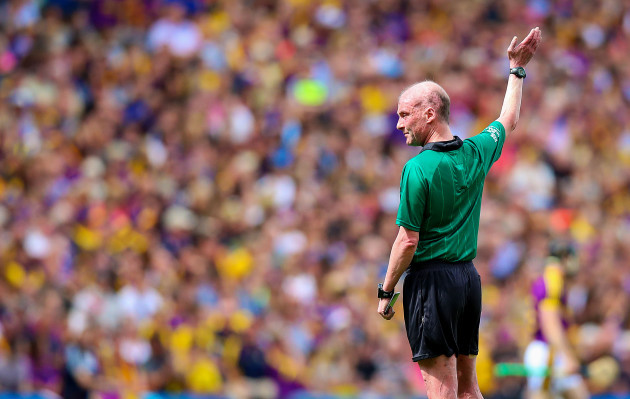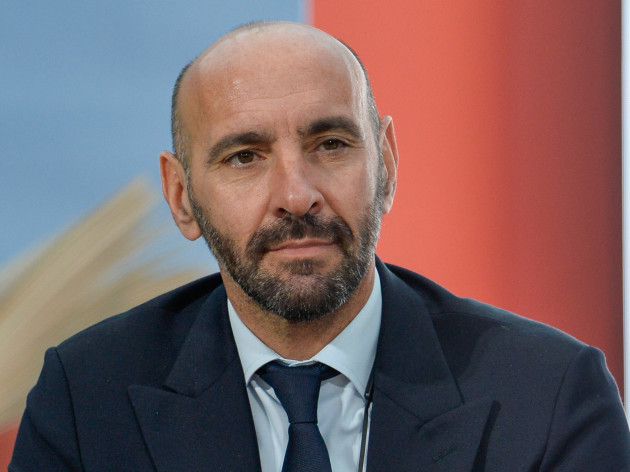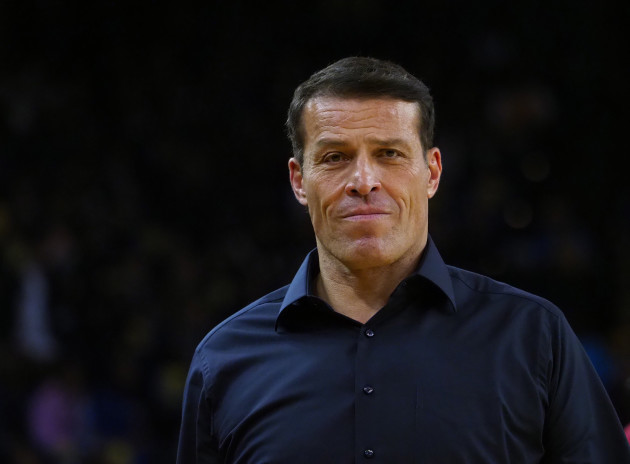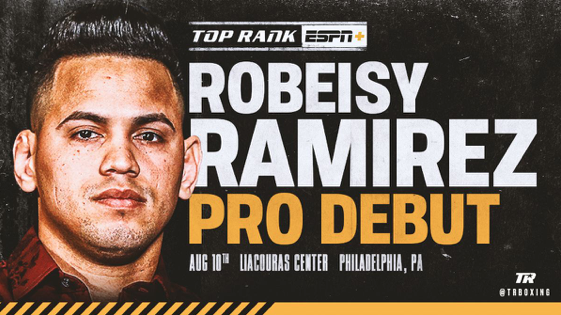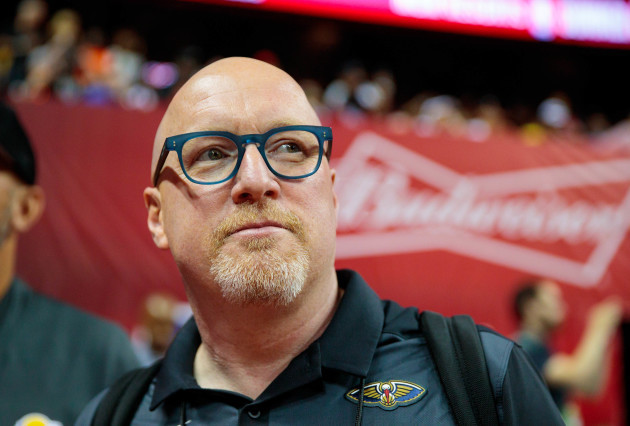1. My own favourite comment on RTÉ social media channels read – “2 referees? For God sake, they get in the way as it is” – which suggested that the commenter was of the view that the game might be improved if there was no referee at all.
This is, I think, worth exploring. No referee. Perhaps it might be worthy of a trial run in next year’s National League.
Think about it.
Before the game, Brian Cody – or if he’s not available we could have an impersonator in a peaked cap – strides out into the middle of the field, blows the whistle, then symbolically swallows it, before swiftly departing the fray, leaving the thirty men on the field “at it”.
For some, this would surely represent a state of hurling nirvana, of manliness unshackled.
And who knows? It may become a reality if the storm of abuse that is routinely dumped over referees’ heads grows any more intense.
Writing for RTÉ, Conor Neville explains how hurling’s refereeing ‘crisis’ is of our own making.
2. Monchi likes players with the hunger to step up, or those prepared to step down to prove a point.
Several had pushed their previous clubs to agree to a sale. That is one advantage Sevilla has found it has in negotiations, an edge gleaned through its reputation: Its interest is a seal of approval. “The word ‘Sevilla’ opens doors with agents and with families,” said Emilio de Dios, the club’s technical secretary, adding, “When you can show them our internal system with 25 reports on them, each of them Grade A, they know that we are serious.”
There had to be sales, of course, to balance things out, including that of the winger, Pablo Sarabia, for Paris St.-Germain, but there was little unrest among the fans, no existential anxiety inside the club.
“There are clubs that think a sale will jeopardize their performance on the field,” said Cruz, the chief executive. “We are calm. If an offer arrives, it is natural. We don’t cry. We are conscious of our position relative to richer clubs. And the fans have seen in the past few years that the replacements will be just as good.”
They trust the quality of the work the scouts do. Monchi has proved, time and again, that Sevilla can sell and buy and emerge stronger at the end of it. Nobody knows the market better than he does; nobody works it better than Sevilla.
And yet when Monchi is asked his secret, his answer has nothing to do with transfers, with scouting, with deals. What has transformed the club built on transfers is not what happens during the summer, but what happens afterward.
In the New York Times, Rory Smith explores how Sevilla and their famed sporting director beat the market every summer.
3.The love went both ways. As so often when talking to people wealthier than him, the Dubliner appeared uncommonly deferential and, in one of many pandering exchanges, told Robbins: “You are a powerful man but you do not use your power to boss”. A strange statement given that Robbins offered a rather unique take on the MeToo movement last year.
“If you use the MeToo movement to try to get significance and certainty by attacking and destroying someone else, you haven’t grown an ounce,” he said to a crowd in San Jose, California who had paid hundreds of dollars for the privilege of hearing him utter this guff. “All you’ve done is basically use a drug called significance to make yourself feel good.”
That comment appears even more loaded given recent revelations.
“Two former followers who went on to work for Robbins provided BuzzFeed News with signed statements swearing under oath that they felt he had sexually harassed them by repeatedly pursuing them after they made clear they weren’t interested,” wrote Jane Bradley and Katie JM Baker, who conducted a lengthy investigation into McGregor’s new best friend earlier this year.
The Irish Times’ Dave Hannigan looks at how an “embarrassing podcast” featuring Tony Robbins and Conor McGregor ticked all the wrong boxes.
The boxer, the restaurateur, the detective and the accountant—they never planned all of this. Not exactly, anyway. How could anyone? The improbable intersection of their lives began like a walked-into-a-bar joke and unfolded like something closer to a Jason Bourne movie. Sure, they knew that helping a two-time Olympic gold medalist defect from Cuba to the U.S. would require an abundance of cash, patience and kismet. But drug cartels and military checkpoints? An immigration march and Marco Rubio?
It all started with a phone call in June 2018. The boxer, 24-year-old Robeisy Ramírez, saw the professional future that awaited him should he make it to the open market, where boxing’s top promoters were salivating over his dominant Olympic runs. From an amateur tournament in Germany he dialed a restaurant in Gulfport, Fla., and asked for the owner, a woman he knew only by her reputation: deft, harried, brilliant. Maybe, by her own admission, a little loco. Ramírez knew one other thing about Jo Hastings. She’d built a side hustle as a liberator of Cuban athletes.
“I understand that you can help me,” Ramírez said in Spanish, explaining that he wanted to defect to the U.S. and that he’d found her through a friend of a friend.
Jo, then 59, told him to listen carefully. She wouldn’t follow the standard (and illegal) game plan for sneaking someone out of Cuba. She wouldn’t draw up a fake passport, like the one White Sox first baseman Jose Abreu says he used, and then ate, on his escape flight to the U.S. in 2013; she wouldn’t turn to illegal smugglers, like the ones who allegedly helped Reds outfielder Yasiel Puig in ’12 and then threatened his life over unpaid debts; she wouldn’t throw Ramírez onto a speedboat in the middle of the night, like countless other escapees.
In Sports Illustrated, Greg Bishop reveals the extraordinary tale of top boxing prospect Robeisy Ramirez’s recent defection from Cuba.
Sitting in the lobby bar at the Vdara, just inside the Las Vegas hotel’s curving driveway, Griffin knocks his bald dome in lieu of wood, a superstition he developed throughout his medical battles. “I have a deeper appreciation for everything now,” he says. He’s wrapped in a navy Pelicans polo and black trousers. Equally blue glasses frame his pale face.
He once planned to master international finance and minor in Chinese, only to spurn an opportunity studying at Taiwan International University on Foot Locker Asia’s dime to intern in his cherished Suns’ public relations department. The brash volunteer vowed he would one day transition into basketball ops and build a champion. The prophecy didn’t call for the chance to do it twice, but Griffin never truly felt comfortable in his Cleveland skin. “And I knew it. I vibrate at a totally different frequency than that group, from an ownership perspective,” he says. “Getting away from it made me find who I really am. It’s funny: Bagger Vance, you know, ‘Your authentic swing?’ I know now, authentically, who I’m meant to be as a leader.”
He wants his new family to feel collaborative. Nearly the entire Pelicans organization attended New Orleans’ morning practices at UNLV’s student rec center, the hardwood overflowing with navy and scarlett team swag. “Doing it the right way with the right people,” Langdon explains. “Not skipping steps.” Zion Williamson’s Friday night debut shook the Thomas & Mack Center before a 7.1 magnitude earthquake in Southern California literally did the job, halting the game in the fourth quarter. Jaxson Hayes delivered his own quake a few games later, baptizing a Bulls defender with a vicious poster dunk off a gorgeous no-look feed from Nickeil Alexander-Walker. “What I love about these kids,” Griffin says. “Jaxson couldn’t wait to tell people how good the pass was. Nickeil couldn’t wait to tell people how easy it is to throw a ball to a guy who can catch anything, anywhere.” Alexander-Walker dazzled en route to first-team All-Summer League honors. Despite rostering Ball, New Orleans plans to develop the rookie as a point guard. That’s what he prefers, too. “It’s easier to play when someone doesn’t just see you as an asset,” Alexander-Walker says. “When they value you and who you are and what you do at multiple levels.”
The Pelicans know their DNA. Williamson has arrived. The team’s experienced trio will pace their locker room and playoff push. Should the experiment one day yield positive results, when the next dissatisfied superstar like Anthony Davis surveys for greener pastures, New Orleans will have both founded an inviting destination while stockpiling the future draft assets to pull the trigger. “We’re going to put a different energy in the universe. It’s going to attract who it’s meant to,” Griffin says. “You won’t get everybody, but that’s OK. Get the right ones.”
Also in Sports Illustrated, Jake Fischer reveals how David Griffin rebuilt the New Orleans Pelicans and his world.
